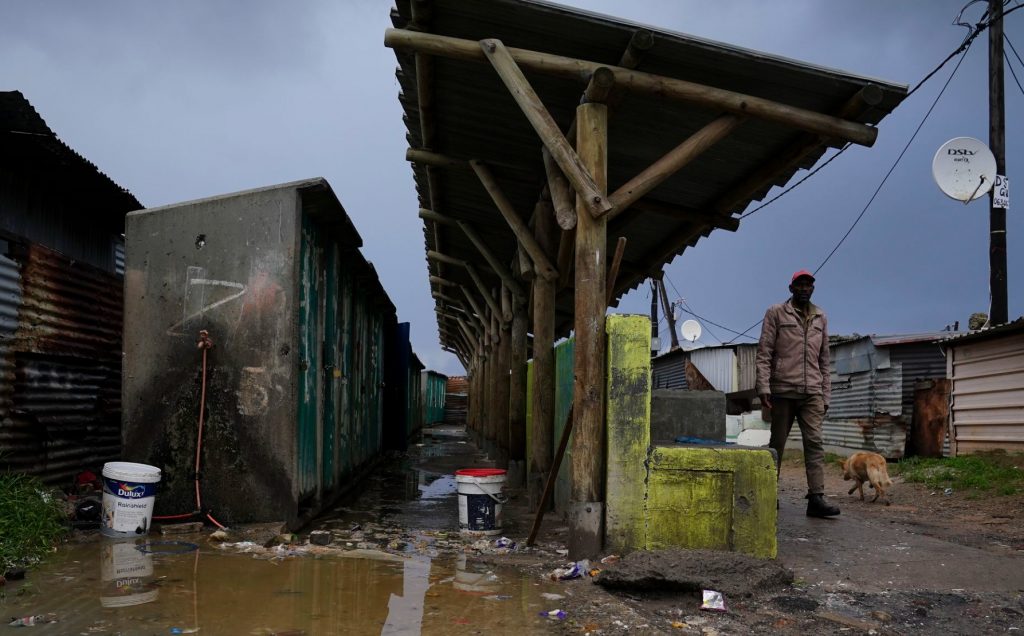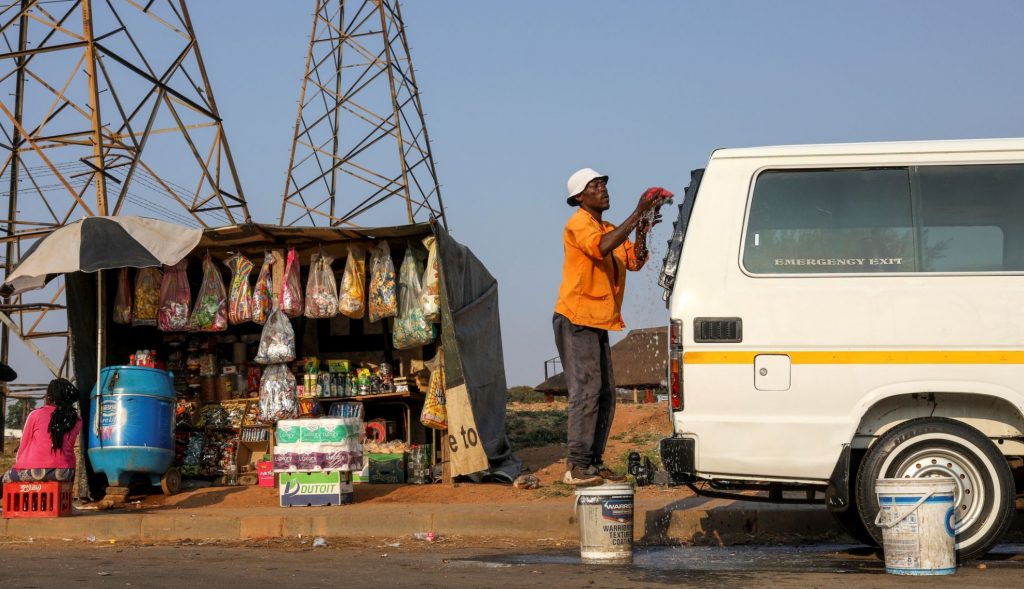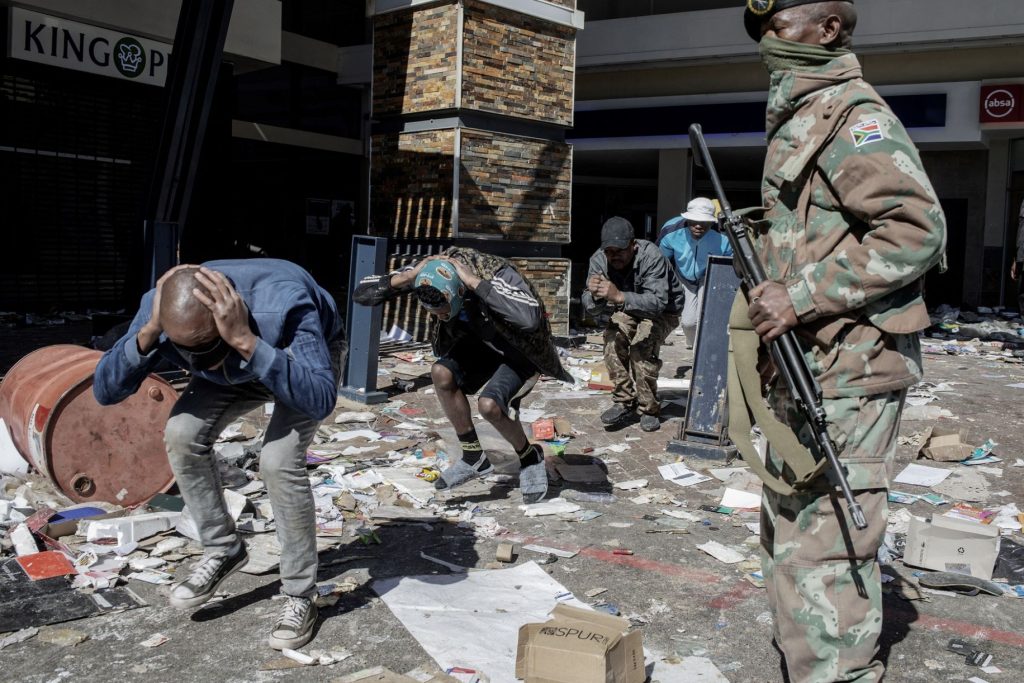The war in Ukraine, covid-19 and political corruption scandals have taken their toll on the economy of South Africa, a country where the inequality gap is still the largest in the world and popular discontent is increasing every day.

NIC BOTHMA (EFE)
Nyasha Matambo is worried. She has left her house early, in a humble suburb 20 minutes from Cape Town, and has come half an hour late to her work due to the heavy traffic early in the morning. But this maid doesn’t even know if she will be able to get to her job the next day. She is concerned about a call for a national strike that has circulated in recent days through different social networks and messaging applications. It is not known where it was started or by whom, but the warnings are very precise: demonstrations are planned throughout the country for citizens to express their dissatisfaction with the increase in fuel prices and the impact that it entails, including the increase of food prices due to higher operating and transport costs.
“If protests materialize and are well attended, be aware of the following risks: heavy foot traffic, intimidation, slow-speed motorcades, and road blockages,” the text reads. Below, she provides an immense list of places that are considered to be at high risk of disturbances, and that includes the headquarters of public institutions, gas stations throughout the country, main highways and national highways. The ad is explosive.
South Africa is not one of the most expensive countries in the world to fill the tank. Gasoline 95 costs 1.43 euros compared to more than two euros in Spain, to give an example, while the per capita income of each country is 4,833 euros in the first and 27,000 in the second. Even so, last May the National Treasury and the Department of Mineral Resources and Energy (DMRE) applied a temporary reduction of the general levy on fuel, of 1.5 rand (0.09 euros) in order to alleviate the impact of the increase caused by the high oil prices resulting from the conflict between Ukraine and Russia and the sanctions that have come later, and which have left a liter of gasoline at 23.94 rands compared to 19.36 rands (1.15 euros ) that cost in January 2022. And in diesel the rise is similar.
In South Africa, 18 million people live on less than 37 euros a month while the average cost of the shopping basket has risen 35 euros in the last year
More than ten thousand kilometers away, the fighting between Russian and Ukrainian soldiers is felt in the pockets of South African citizens. A difference of less than 30 cents may not seem like much, but it makes a huge difference in the quality of life of millions of families in a country where the minimum wage is 270 euros, but the average price of the shopping basket has increased almost 35 euros in the last year, and the inflation rate is around 5.9% and is expected to rise.
“Of course I notice. Above all, the price of cooking oil”, complains Agnes Wisilamu, a Zimbabwean and also a domestic worker. “I have two sons, 17 and 19 years old, both studying; At that age they eat a lot…”. She, as a single mother, must balance the accounts. For a day’s work she earns 170 rand, about 10 euros. From that amount she must deduct what she spends on the bus ticket to go and return from her house, in the deprived neighborhood of Langa, to the center of Cape Town. “Now I pay 16 rand each way, that’s 32, from the 20 it cost in January,” she calculates.
South Africa is one of the most prosperous countries on the continent, but it is also the most unequal nation in the world. Before the end of the racist apartheid regime in 1992, the white minority was much richer than the black majority. When Nelson Mandela became president he promised to close this gap, but 40 years later it persists: if at that time 87% of the land was owned by white landowners, today the circumstances are not much better for blacks, who make up almost 90% of the 51 million inhabitants of the country and who, however, earn three times less on average than whites. According to government data, more than 18 million people live with less than 37 euros a month and 13 million have no income.
A battered economy
The South African economy has been suffering since 2009, when the country entered a recession for the first time in 17 years, and since then it has not reached previous levels of growth. In the last two years, the arrival of covid-19 has worsened the situation, as this country suffered one of the harshest confinements in the world and this had a very negative effect on millions of people, especially those who depend on informal jobs.
And although the pandemic is becoming more and more a thing of the past and the measures are being relaxed – 43% of South Africans have the complete vaccination schedule and can now go out without a mask – the disaster has been great. Today, the country has reached an unemployment rate of 34.5%. Almost half of the entire black population in the country, which is 45 million, is unemployed. And among young people, the situation is much worse: 63.9% of them are unemployed, according to state statistics.

SIPHIWE SIBEKO (REUTERS)
Although there is a monthly aid called the Social Relief Subsidy approved last March of 350 rands, about 20 euros, which more than seven million people have requested and which should be granted until March 2023, it was not paid for a month then without any justification: “It is totally unacceptable that the subsidies have not been paid to the beneficiaries during the last two months (April and May). This is plunging the 10 million beneficiaries into absolute poverty and desperation”, the Congress of South African Trade Unions (Cosatu) denounced on June 10 in a statement. The Government reported last Monday that these subsidies will resume before the end of the current month, but for now they still do not reach the beneficiaries.
Millions lost to violence
The latest political corruption scandals also influence popular discontent. Different members of the African National Congress (ANC), Mandela’s party and in power since the beginning of the democratic era, have been involved in scandals of greater or lesser importance, but one of them has cost South Africa dearly: the indictment of former president Jacob Zuma. The former top leader of the country between 2009 and 2018 was sentenced to 15 months in prison in July 2021 for contempt of justice, after refusing to testify up to three times for 16 charges of fraud, corruption and organized crime.
When the sentence was passed in July last year and Zuma entered prison, the worst riots of the last 40 years took place. Supporters of the former president went out to set fire to the streets, and looting of shops, violence and looting were a constant for eight days in the states of Gauteng and KwaZulu-Natal. The balance of the uprising was 337 dead, more than 40,000 shops destroyed, a loss of one million jobs – other studies calculate two million – and 50,000 million rands; almost three billion euros.
With this situation of social unrest, Niasha Matambo would not be surprised if the national strike succeeded and provoked violent disturbances. For now, he knows that he has no choice but to leave his three-year-old daughter at home. “Her school will not open; I was notified when I took her to class this morning”, she assures. And she prefers it because she is afraid of what might happen. “When these people say something, they mean it; they cut roads, burn tires and are violent with those who try to work. I still remember the shooting of drivers last year”, she assures about some incidents that occurred in July 2021 that left several injured by firearms.

LUCA ALONE (AFP)
She is referring to the taxi drivers, which in South Africa are not cars but privately owned minibuses who decide the route and the price. And that they are the ones who really decide whether to protest or not. The support of the National Taxi Alliance (NTA) and the South African Taxi Council (Santaco), the main unions, is what she really fears.
That is why both assistants are also considering whether to ask their employers to allow them to miss one day and make up the hours the next. But, like millions of people, Matambo and Wisilamu are paid by the day they work, they don’t have a fixed salary, so before asking they have to do the math and see if they can afford it.
A dead protest before birth
Meanwhile, South African social networks are multiplied with messages with the hashtag #nationalshutdown in the days leading up to the protest. “I fully support the strike because everything is a disaster, we have to fix the country,” writes a Twitter user. “I’m not unemployed or poor, I’m a middle class citizen, but I can’t take it anymore,” tweets another. Many other citizens, however, discourage Internet users from participating in the interest of peace and non-violence.
The media, meanwhile, play down the appeal and during the previous days they were barely mentioned in the national headlines. Only late in the afternoon of the day before the protest, a couple of newspapers announce that NTA and Santaco have distanced themselves from the matter. “The taxi industry will not be intimidated by people who promote disorderly conduct,” they tweet from Santaco. They also distance themselves from Cosatu. “We discourage our members from joining this strike because it is an unprotected action that can lead to their dismissal,” says spokeswoman Sizwe Pamla, although she also indicates that the union shares the same complaints as the organizers, whoever they are. be.
D-day arrived, which was last June 10, the country woke up calm. The news did not report any disturbances and the gas stations where there could supposedly be more problems recorded no incidents; Neither are national highways or factories. At mid-morning, Nyasha Matambo sent a WhatsApp: “everything has gone well, I have been able to go to work.” The call fizzled out as quickly as it was raised and, as most of the time, South Africans showed that they prefer peace to violence. But economic suffocation is becoming more evident and the recent news that the economy has expanded by 1.9%, returning it to pre-pandemic levels, still means nothing for Matambo and Wisilamu, who do nothing but watch the size of the holes in your pockets increase and your patience decrease.
